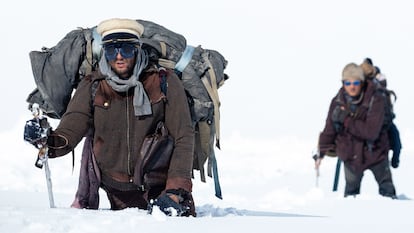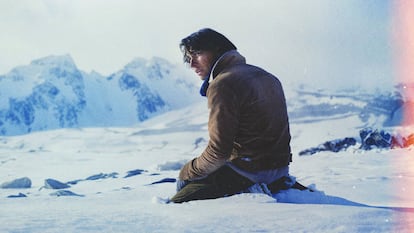‘Society of the Snow’: A credible and emotional portrait of the horror of the Andes crash
J. A. Bayona has achieved a film that is as heartfelt as it is beautifully made

La sociedad de la nieve (Society of the Snow) begins as a party. It shows the camaraderie, the pleasure of being together, the joy and excitement of a Uruguayan rugby team preparing for a tournament in Chile. This joyful mood, this intimate team spirit, the constant laughter and jokes, are prolonged in the airplane transporting them across the impressive landscape of the snowy peaks of the Andes. Everything has the air of a youthful comedy. That tone will suddenly turn into tragedy when dark destiny, or the mechanics, or bad luck, causes the plane to crash in a landscape that from that moment on will no longer be beautiful but something terrifying. Twenty-nine passengers died in the accident, and seeing what awaited the survivors, we might think that they were immediately fortunate. Survival will become a tragedy. It also became an epic. And some were able to talk about that hell, and the salvation they achieved.
Something strange happened to me watching this film. If it only bowed to the imagination of the scriptwriters — if it were fiction — I would not lend credence to many things that I saw and heard. But that horror was real, as J. A. Bayona tells us with solvency and contagious emotion. There are oral testimonies from the survivors and Pablo Vierci, a friend of some of them, wrote a book about that hellish but moving experience. Bayona introduces a story that makes you rub your eyes in disbelief, makes you feel creeping anguish, gives authenticity to the sensations of hunger and cold, despair and hope, the desire to end it all, and the insane longing to find a door to salvation.
It is chilling to see the only recourse they had so they would not die of starvation, their freezing surroundings, the onset and progression of diseases, and not only physical ones. The daily suffering of the heart and the brain. And you are amazed when you realize that in that unimaginable hell, solidarity, mutual care, generosity, communication between people in agony, the impetus to find a way to rescue them, worked. Some of them state with desolation that the world has abandoned them, when they hear on the radio that they are definitively lost. And several of them are consumed forever.

As it continually brings you back to reality, you know that it had a relatively happy ending, that 16 of those 45 people were rescued alive. And that they spent over three months surviving in those savage conditions. What’s hard to imagine is how they managed to integrate into everyday life afterward, if their experience didn’t give them perpetual nightmares.
I was not addicted to most of Bayona’s triumphant cinema. Nor did I like the episodes he shot for The Lord of the Rings: The Rings of Power. I did, on a visual and emotional level, find what he achieved in The Impossible more than acceptable. But in Society of the Snow, everything works perfectly. It is a film as heartfelt as it is beautifully made. I feel inside it all the time. Its aesthetics are powerful. There are no narrative lapses. And all the actors (I didn’t know any of them) are authentic and relatable. Even if you know the story and how it ends, you experience it in a state of suspense and compassion.
'Society of the Snow'
Director: Juan Antonio Bayona.
Cast: Enzo Vogrincic, Matías Recalt, Rafael Federman, Agustín Pardella, Esteban Bigliardi.
Genre: Drama. Spain, 2023.
Runtime: 144 minutes.
Spain release date: December 15.
U.S. release date: December 22.
Sign up for our weekly newsletter to get more English-language news coverage from EL PAÍS USA Edition
Tu suscripción se está usando en otro dispositivo
¿Quieres añadir otro usuario a tu suscripción?
Si continúas leyendo en este dispositivo, no se podrá leer en el otro.
FlechaTu suscripción se está usando en otro dispositivo y solo puedes acceder a EL PAÍS desde un dispositivo a la vez.
Si quieres compartir tu cuenta, cambia tu suscripción a la modalidad Premium, así podrás añadir otro usuario. Cada uno accederá con su propia cuenta de email, lo que os permitirá personalizar vuestra experiencia en EL PAÍS.
¿Tienes una suscripción de empresa? Accede aquí para contratar más cuentas.
En el caso de no saber quién está usando tu cuenta, te recomendamos cambiar tu contraseña aquí.
Si decides continuar compartiendo tu cuenta, este mensaje se mostrará en tu dispositivo y en el de la otra persona que está usando tu cuenta de forma indefinida, afectando a tu experiencia de lectura. Puedes consultar aquí los términos y condiciones de la suscripción digital.









































